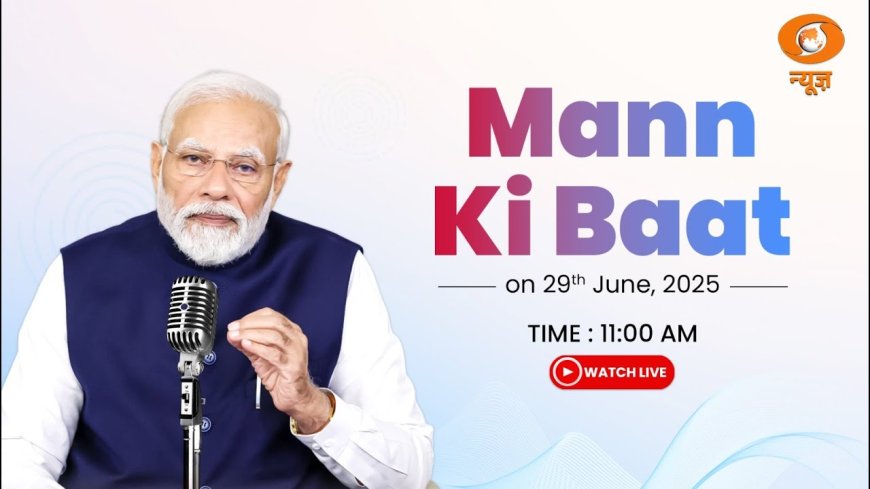PM Modi’s 123rd Mann Ki Baat Highlights Democratic Vigilance, Public Health Triumphs, and Cultural Pride
PM Modi’s June 2025 Mann Ki Baat touched on the Emergency anniversary, trachoma eradication, Eri silk’s GI tag, grassroots entrepreneurship, and Bodoland’s football transformation.

In the 123rd episode of his monthly radio programme Mann Ki Baat, Prime Minister Narendra Modi addressed the nation with a blend of reflection, pride, and call-to-action, covering a wide spectrum of themes ranging from democracy and healthcare to traditional crafts and sports revival.
Emergency: A Dark Chapter Remembered
Opening the broadcast with a sharp reminder of India's past, the Prime Minister marked the 50th anniversary of the Emergency imposed in 1975, calling it “a period when the Constitution was subverted and the judiciary was shackled.” He urged citizens, particularly the youth, to remain vigilant in protecting democracy and constitutional values. Modi emphasized that the Emergency was not just a political event, but an assault on civil liberties, free speech, and institutional integrity.
Archival audio clips of former Prime Ministers Morarji Desai and Atal Bihari Vajpayee were shared to underline the resilience of India’s democratic spirit and the importance of remembering history as a lesson for the future.
India Declared Free of Trachoma
In a significant health update, Prime Minister Modi proudly announced that India has been officially declared free of trachoma, a contagious eye disease that was once a major cause of blindness in the country. He credited government initiatives, community health workers, and awareness campaigns for this achievement, and described it as a "public health milestone that reflects India's commitment to wellness and disease elimination."
He linked this development to the broader message of preventive health, reiterating the importance of hygiene, yoga, and physical well-being as everyday practices.
Celebrating ‘Ahimsa Silk’ and Local Innovation
The Prime Minister spotlighted Meghalaya’s Eri Silk, which recently earned a Geographical Indication (GI) tag. This cruelty-free silk—also known as "Ahimsa Silk"—is produced without killing silkworms and has strong environmental and ethical value.
Modi praised the artisans of Meghalaya and called on citizens to embrace and promote indigenous products, saying: “Our traditional textiles are not only eco-friendly but also globally relevant. Let’s support them under the mantra of ‘Vocal for Local’.”
He also acknowledged being gifted a Ryndia shawl made from Eri silk by Meghalaya Chief Minister Conrad Sangma, which he described as a symbol of India's rich and compassionate craftsmanship.
Grassroots Success Stories: Women and Sports
Modi highlighted inspiring grassroots stories that represent the strength of self-reliant India:
-
Khadak Rotti in Karnataka: The Prime Minister commended a women-led self-help group in Kalaburagi (Gulbarga), Karnataka, that produces over 3,000 traditional "Khadak Rottis" daily. These are now being sold online across India. He lauded their entrepreneurial spirit and urged people to support such local businesses, especially those rooted in tradition.
-
Football Revival in Bodoland: Turning attention to Assam, Modi praised the transformation of the Bodoland Territorial Region (BTR), which has emerged as a football hub. Over 70,000 youth now participate in tournaments like the Bodoland CEM Gold Cup. He described the shift from “terror to talent” as a powerful symbol of peace and youth empowerment.
Spirituality and Wellness: The Role of Pilgrimage
Modi emphasized the importance of religious pilgrimages in Indian life, calling them not just acts of devotion but also pathways to mental and physical rejuvenation. He linked these spiritual journeys with India’s growing wellness movement, saying that pilgrimages combine inner peace, physical activity, and cultural bonding, making them a holistic practice.
He also reiterated the value of daily yoga, especially among the younger generation, as a means to foster mindfulness, reduce stress, and build national well-being.
Democracy and Civic Responsibility
Returning to the theme of democracy, Modi stressed that protecting the Constitution is a shared responsibility. He urged listeners to study India’s constitutional values, remain active in civic life, and resist any effort to suppress democratic institutions.
He called for citizens to not merely celebrate democracy in theory but practice it through participation, awareness, and accountability.
Conclusion
PM Modi’s 123rd Mann Ki Baat was a tapestry of reflections—on history, culture, health, and innovation. From remembering the trauma of the Emergency to celebrating the eradication of trachoma and the triumphs of local enterprises and athletes, the address reinforced his broader vision: a self-reliant, healthy, culturally proud, and democratically resilient India.
The message was clear: whether by remembering the sacrifices of the past or promoting the talents of today, citizens play an essential role in shaping the India of tomorrow.














